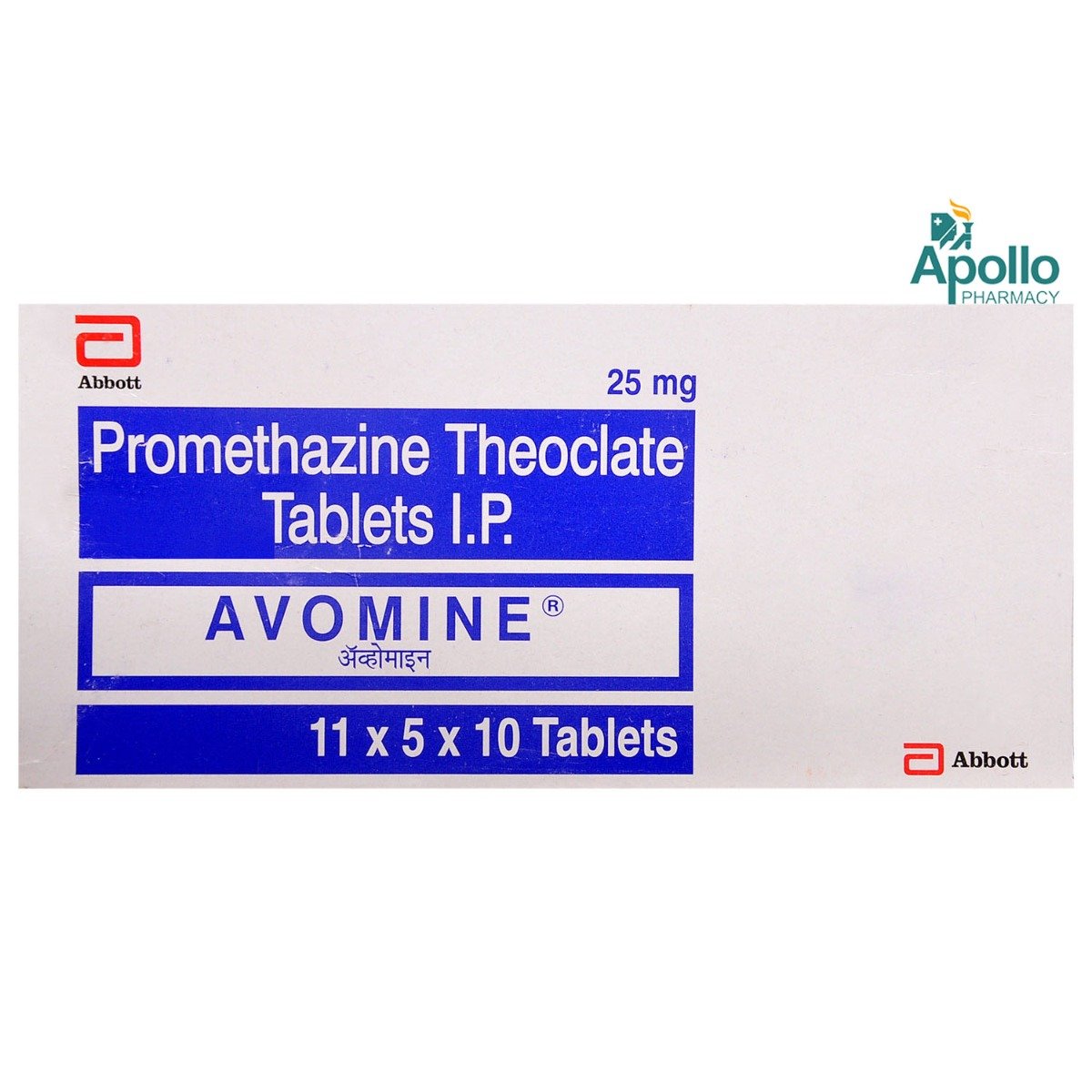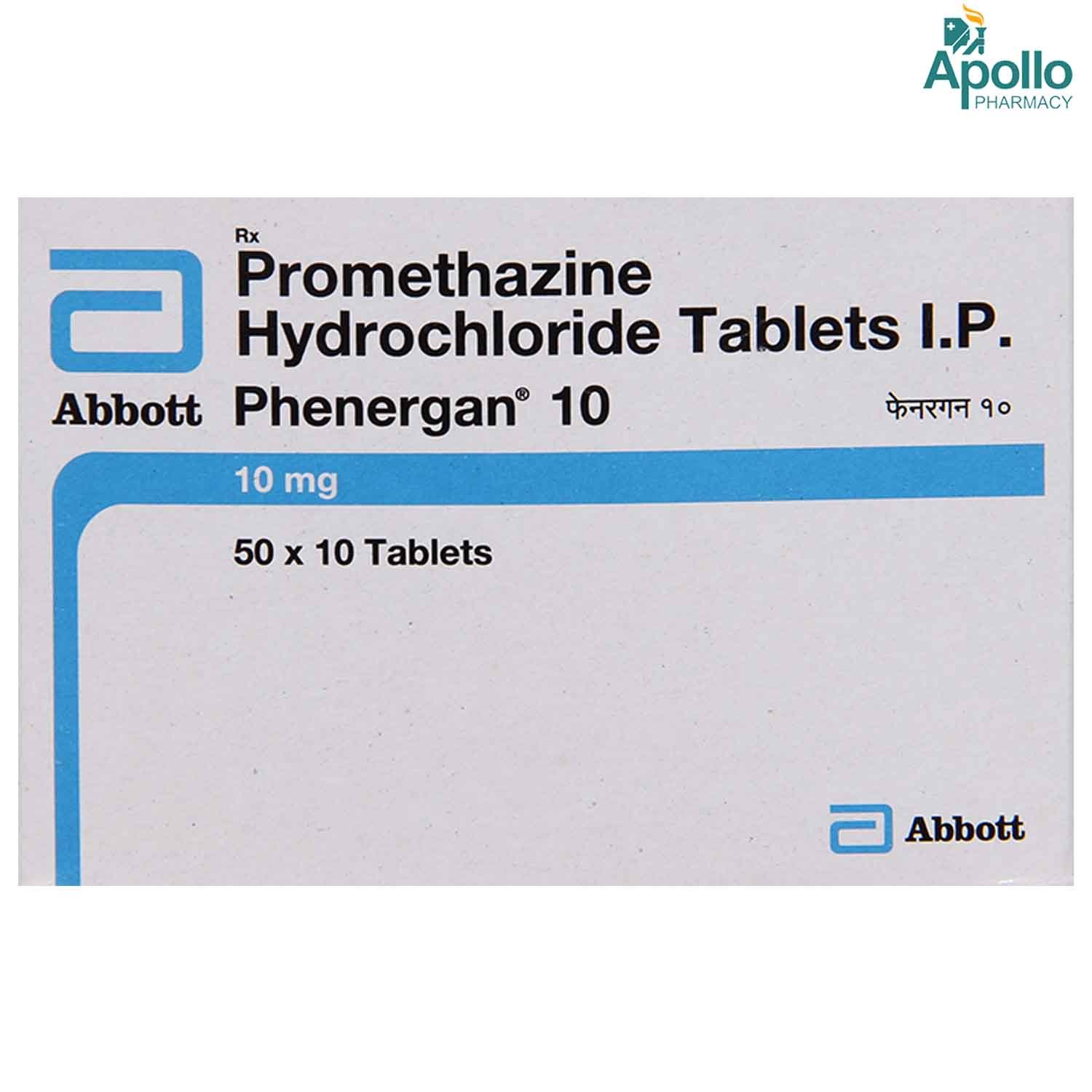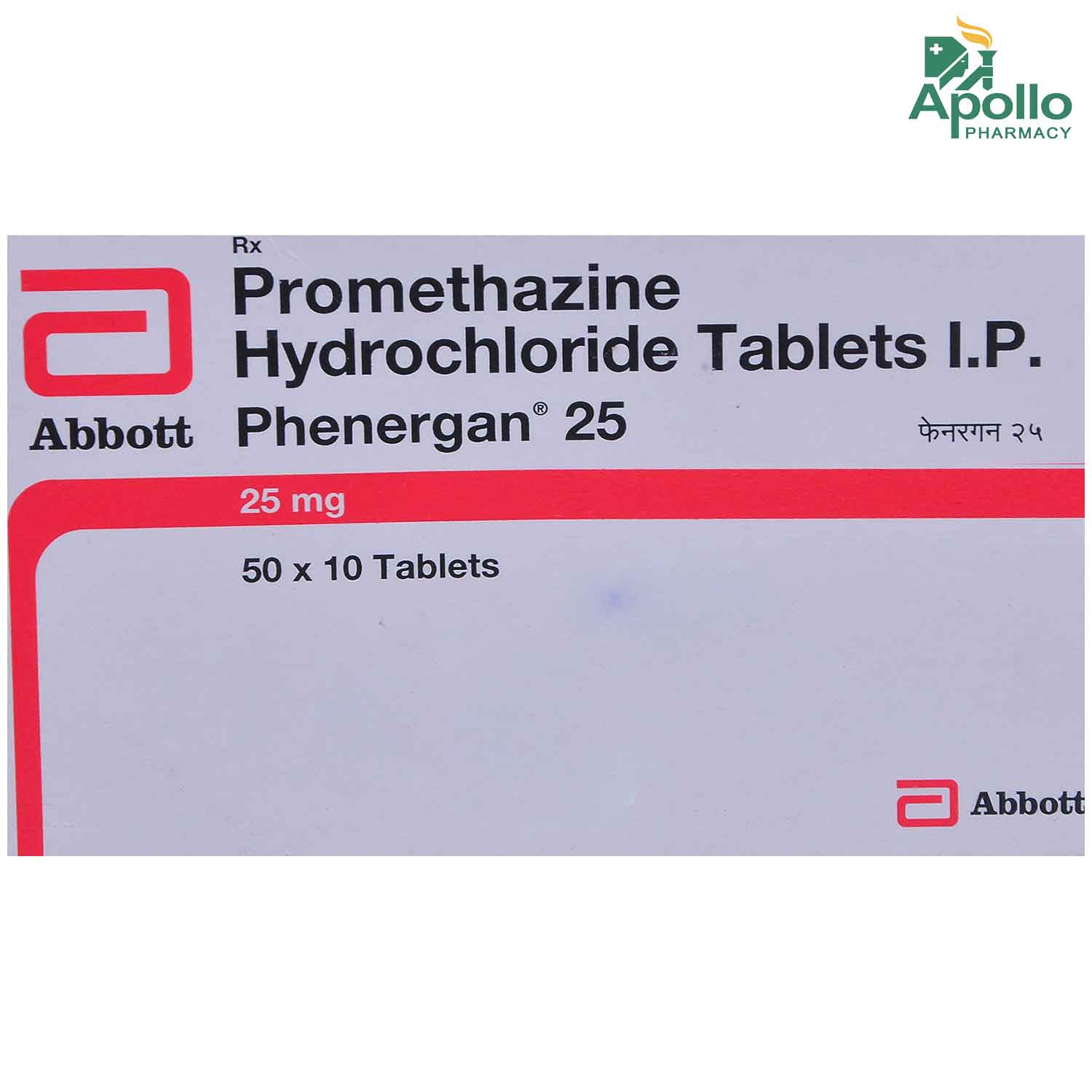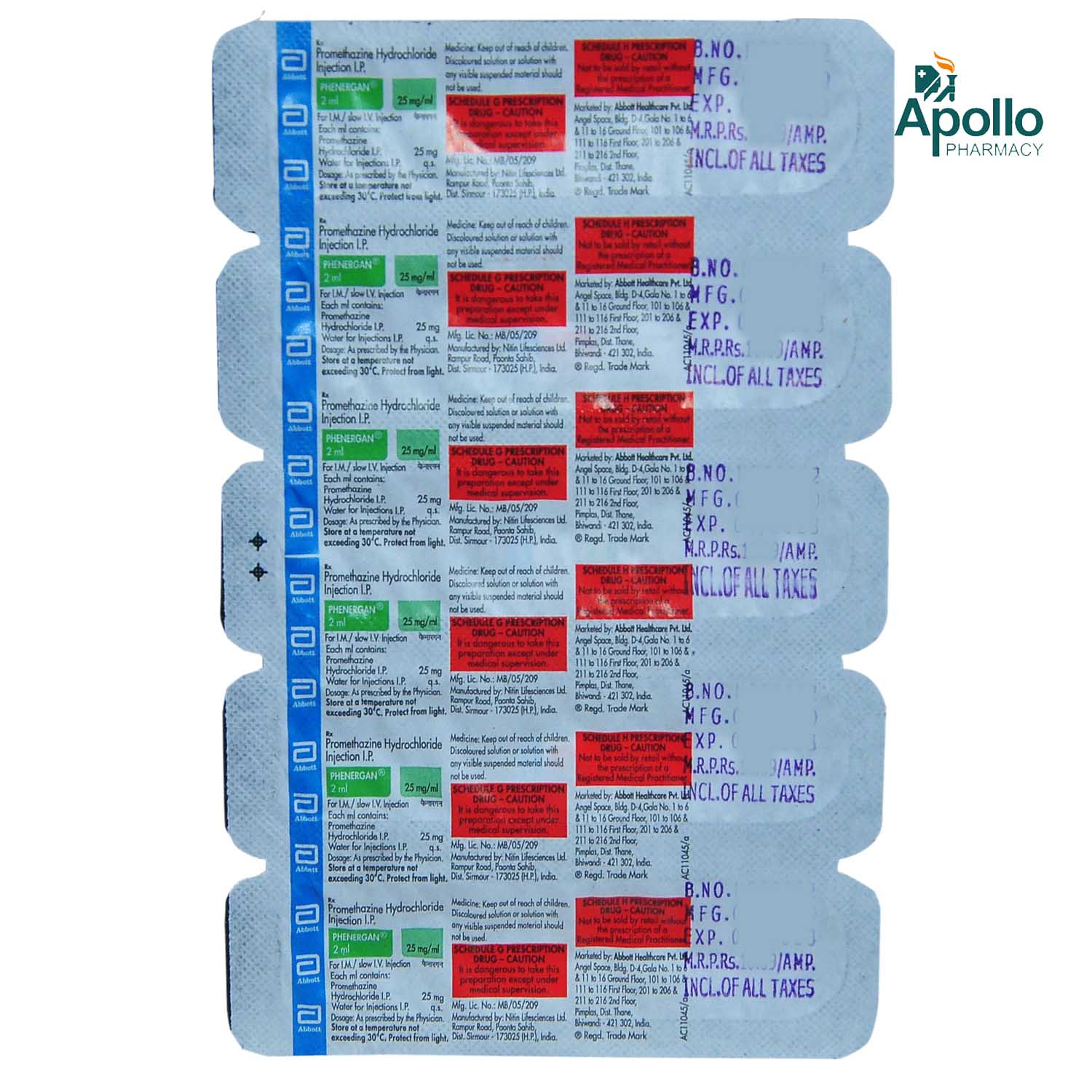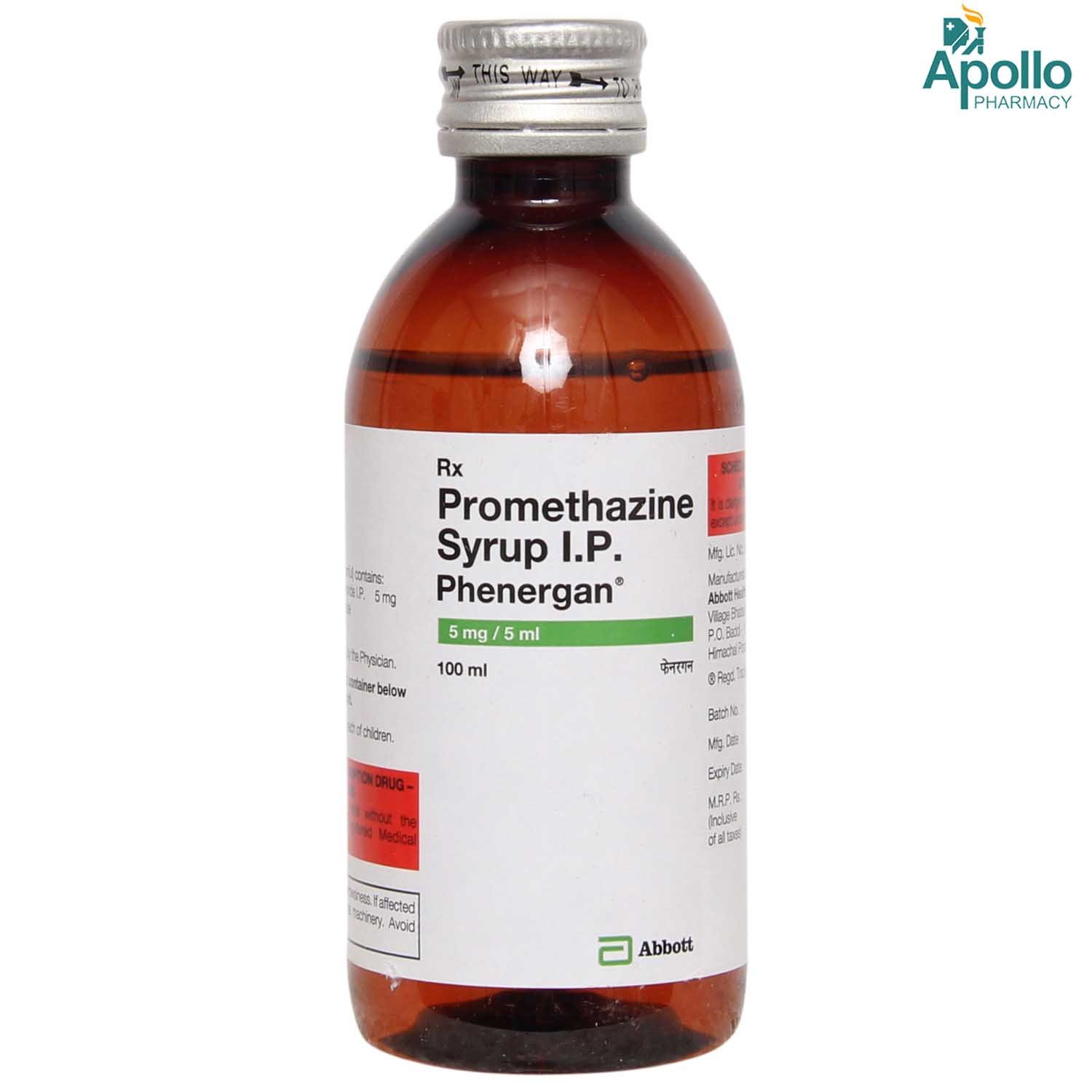Promethazine
About Promethazine
Promethazine belongs to the class of medications called ‘antihistamines’ used in the treatment of allergic reactions, insomnia, and travel sickness. Allergy or hypersensitivity is an immune system response to foreign elements typically not harmful to your body. Insomnia is a sleep disorder characterized by difficulty falling or staying asleep. Travel sickness is an illness caused by motion during travel characterized by nausea and vomiting.
Promethazine contains ‘promethazine’, which acts as an antihistamine. It blocks the action of histamines (chemicals causing allergic symptoms) and reduces the allergic reaction. It also acts on the brain directly and produces a calming and anti-nausea effect.
Take Promethazine as prescribed. The dose and duration of this medicine are advised by your doctor. Common side effects of Promethazine are dry mouth, blurred vision, drowsiness, dizziness, headache, tiredness, disorientation, having nightmares, confusion, restlessness, loss of appetite, indigestion, low blood pressure (hypotension), photosensitivity (redness or rashes on sun-exposed skin) and an uncontrollable urge to move the legs (Restless Legs Syndrome). If these side effects persist or worsen, please consult a doctor.
Do not take Promethazine if you are allergic to promethazine or any contents of it. Promethazine should not be given to children below 2 years of age due to the risk of potential respiratory depression (slow and ineffective breathing). Promethazine may cause skin photosensitivity (rashes and redness on sun-exposed skin). So, avoid prolonged exposure to sunlight. Promethazine may cause dizziness, so you should not drive or operate heavy machinery. Inform your doctor if you have sleep apnea (sleeping disorder) or chronic obstructive pulmonary disease (COPD) (a lung disease) as this medicine may cause respiratory depression or excessive drowsiness. Do not consume alcohol while taking this medicine. Promethazine tablets contain lactose, so inform your doctor if you have an intolerance to sugars.
Uses of Promethazine
Medicinal Benefits
Promethazine contains ‘promethazine’ which belongs to the class of ‘phenothiazines’. It is an antihistamine and blocks the action of histamines (chemicals causing allergic symptoms). It can effectively treat allergic symptoms such as itching, watery eyes, hives, runny nose and sneezing. It also acts on the brain directly and produces a calming and anti-nausea effect. For short-term use, it is used in the treatment of insomnia. It can treat symptoms such as feeling sick (nausea) and fall sick (vomiting) occurring due to travel or motion sickness.
Directions for Use
Storage
Side Effects of Promethazine
- Dry mouth
- Blurred vision
- Drowsiness
- Dizziness
- Headache
- Tiredness
- Disorientation
- Having nightmares
- Confusion
- Restlessness
- Loss of appetite (anorexia)
- Indigestion (dyspepsia)
- Low blood pressure (hypotension)
- Photosensitivity (redness or rashes on sun-exposed skin)
- Uncontrollable urge to move the legs (Restless Legs Syndrome)
Drug Warnings
Do not take Promethazine if you are allergic to Promethazine or any other contents of it. Before taking Promethazine, please tell your doctor if you are using any antidepressants as taking these two medicines together can cause severe drowsiness. This medicine should not be given to children below 5 years of age and patients who are unconscious or have severe drowsiness, dizziness or headache. Inform your doctor if you have difficulty breathing, asthma or bronchitis (lung problems), epilepsy (fits), serious heart problems, liver or kidney problems, a stomach blockage, hearing problems, increased pressure in the eye (glaucoma) and Reye’s Syndrome (swelling in the liver and brain in children). Also, inform your doctor if you are pregnant or breastfeeding. This medicine causes dizziness and drowsiness. So, limit alcohol intake and refrain from activities that require you to stay mentally alert. Avoid prolonged exposure to sunlight or the use of sun lamps as it may cause photosensitivity (rashes on sun-exposed skin).
Drug Interactions
Drug-Drug Interactions: Promethazine may interact with anticholinergic medicines, antidepressants, sedatives (diazepam and zolpidem) and painkillers (aspirin).
Drug-Food Interactions: Alcohol may alter the effect of Promethazine.
Drug-Disease Interactions: Promethazine should be used with caution in patients with respiratory diseases (asthma), liver or kidney problems, serious heart problems, sleep disorders, seizures, hearing problems, glaucoma (eye problems) and Reye’s Syndrome (swelling in the liver and brain in children).
Drug-Drug Interactions Checker List:
Safety Advice

Alcohol
cautionPromethazine increases the drowsiness when alcohol is consumed. So, do not take alcohol while using Promethazine.

Pregnancy
unsafePromethazine is a category C medicine. It may cause toxic effects to the fetus. It should be used in pregnant women only if needed. Please consult your doctor. Your doctor will weigh the benefits and any potential risks before prescribing it to you.

Breast Feeding
unsafePromethazine may pass into breast milk and cause harmful effects to the baby. So, do not use Promethazine in breastfeeding mothers unless prescribed by your doctor.

Driving
cautionPromethazine may cause drowsiness and dizziness. So, avoid driving or operating heavy machinery while using Promethazine.

Liver
cautionPromethazine should be used with caution in patients with liver diseases. Your doctor will weigh the benefits and any potential risks before prescribing it to you. Please consult your doctor.

Kidney
cautionPromethazine should be used with caution in patients with kidney diseases. Your doctor will weigh the benefits and any potential risks before prescribing it to you. Please consult your doctor.

Children
cautionPromethazine is not recommended for use in children below 5 years of age. For children above 5 years of age, dose adjustments may be necessary if prescribed by a child specialist.
Habit Forming
Diet & Lifestyle Advise
Allergy:
- Stay hydrated as it is vital for those with a cough or cold. Drinking liquids at room temperature can alleviate cough, runny nose and sneezing.
- Avoid stress as the immune system is affected by stress and raises the risk of being sick. An individual can exercise regularly, meditate, do deep breathing, and try progressive muscle relaxation techniques to relieve stress.
- Stay fit and safe and try to sleep 7-9 hours each night.
- Avoid contact with known allergens (allergy-causing agents) such as pollen, dust, etc. Certain food items are known to cause allergies to you.
- Maintain personal hygiene and keep your surroundings clean.
Insomnia:
- Maintain a sleep schedule. Wake up at the same time every day, including on weekends. Make a comfortable sleeping environment.
- Stay active.
- Avoid naps.
- Do not eat large meals before going to bed.
- Limit alcohol intake and quit smoking.
Travel sickness:
- Avoid spicy, greasy and acidic foods before traveling. Opt for cereals, apples, bananas or bread.
- Reduce speed if required.
- Position yourself where motion is least, like in the front in a car, centre in a boat or ship and over the wings in an airplane.
- Breathe fresh air if possible by opening the window.
- Avoid alcohol 24 hours before travel and during the travel.
Special Advise
- Promethazine makes your skin sensitive, So, try to avoid going into sun for long time, avoid going under sun lamps, use effective sunblock and wear protective clothing while going out.
- Inform your doctor before undergoing any allergy test that you are using Promethazine.
Patients Concern
Disease/Condition Glossary
Allergy: An allergy (hypersensitivity) is an immune system response to foreign elements typically not harmful to your body. These foreign elements are known as ‘allergens’. Symptoms include itching, watery eyes, hives, runny nose and sneezing. Allergic condition varies from person to person. Some might be allergic to certain foods and seasonal allergies like hay fever. At the same time, others might be allergic to pollen or pet dander.
Insomnia: Insomnia is a sleep disorder that causes frequent difficulty in falling or staying asleep. It occurs due to poor sleeping habits, depression, lack of physical activity or long-term illnesses. It can be acute (short-term) or chronic (long-term), depending on the underlying cause.
Travel sickness: It is an illness caused by motion during travel. The illness usually goes away when the motion stops. Symptoms include nausea, vomiting, dizziness and tiredness.
FAQs
Promethazine blocks the action of histamines, chemicals that are responsible for allergic reaction. It acts directly on the brain and causes a relaxing, calming and anti-nausea effect.
Promethazine is usually recommended for short-term use. Do not take longer than prescribed unless advised by your doctor.
Promethazine is not recommended for use in children below 5 years of age as it can cause respiratory depression (slow and ineffective breathing). In children above 5 years of age, use only prescribed by a child specialist.
Do not drive or consume alcohol as Promethazine can cause drowsiness. Do not go into the sunlight directly as it can cause photosensitivity leading to rashes on sun-exposed skin.
You can take the missed dose as soon as you remember if it's less than 2 hours since the missed dose. However, if it is almost time for the next dose, skip the missed dose and take the next dose as usual at the fixed time. Do not double your dose or do not take more than prescribed.
Restless legs syndrome (RLS) is a condition that causes an uncontrollable urge to move your legs, usually because of an uncomfortable sensation. It typically happens in the evening or nighttime hours when you're sitting or lying down. Moving eases the unpleasant feeling temporarily.




